Pocket K No. 2: Plant Products of Biotechnology
| |
Plant products of biotechnology have been available in the market for 23 years in 2018. These modified crops look like their traditional counterparts, but they possess special characteristics that make them better. These crops offer several benefits both farmers and consumers. Farmers gain higher crop yields and have increased flexibility in management practices while consumers have “healthier crops” (i.e., crops grown with fewer pesticides and/or with healthier nutritional characteristics).
Plant products of biotechnology approved for food use have been modified to contain traits such as:
• Insect resistance
• Disease resistance
• Herbicide tolerance
• Altered nutritional profile
• Enhanced storage life
Examples of plant products of biotechnology
| Product | Trait |
| Alfalfa | Herbicide tolerance, altered lignin production |
| Apple | Non-browning |
| Bean | Virus disease resistance |
| Canola | Herbicide tolerance, modified oil/fatty acid, pollination control system, phytase production |
| Cotton | Herbicide tolerance, insect resistance, low gossypol |
| Eggplant | Insect resistance |
| Flax, Linseed | Herbicide tolerance |
| Maize | Abiotic stress tolerance, altered growth/yield, herbicide tolerance, insect resistance, modified product quality (modified alpha amylase, lysine boost, phytase production), pollination control system |
| Melon | Delayed ripening |
| Papaya | Disease resistance |
| Pineapple | Delayed ripening, modified fruit color |
| Plum | Disease resistance |
| Potato | Disease resistance, herbicide tolerance, insect resistance, modified product quality (modified starch, reduced acrylamide potential, non-bruising), fungal disease resistance |
| Rice | Herbicide tolerance, insect resistance, anti-allergy, modified product quality (biofortified with Provitamin A, anti-allergy) |
| Rose | Modified flower color |
| Safflower | Modified product quality |
| Soybean | Herbicide tolerance, insect resistance, modified product quality, altered growth/yield, abiotic stress tolerance, modified oil/fatty acid |
| Squash | Disease resistance |
| Sugar beet | Herbicide tolerance |
| Sugar cane | Insect resistance, drought tolerance |
| Sweet pepper | Disease resistance |
| Tomato | Disease resistance, insect resistance, delayed ripening, delayed fruit softening |
| Wheat | Herbicide tolerance |
BIOTECH SOYBEAN
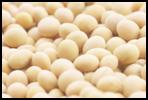
Soybean is the oil crop of greatest economic relevance in the world. Its beans contain proportionally more essential amino acids than meat, thus making it one of the most important food crops today. Processed soybeans are important ingredients in many food products.
Herbicide tolerant soybean
Herbicide tolerant soybean varieties contain a gene that provides resistance to one of two broad spectrum herbicides.
This modified soybean provides better weed control and reduces crop injury. It also improves farm efficiency by optimizing yield, using arable land more efficiently, saving time for the farmer, and increasing the flexibility of crop rotation. It also encourages adoption of no-till farming - an important part of soil conservation practice. These varieties are the same as other soybeans in nutrition, composition, and in the way they are processed into food and feed. *Approved (for import or cultivation) in the following countries: Argentina, Australia, Bolivia, Brazil, Canada, Chile, China, Colombia, Costa Rica, European Union, India, Indonesia, Iran, Japan, Malaysia, Mexico, New Zealand, Nigeria, Paraguay, Philippines, Russia, Singapore, South Africa, South Korea, Switzerland, Taiwan, Thailand, Turkey, United States of America (USA), Uruguay, and Vietnam.
Insect resistant soybean
This biotech soybean exhibits resistance to lepidopteran pests through the production of Cry1Ac protein. Insect resistant soybean was developed to reduce or replace high insecticide applications and at the same time maintain soybean yield potential.*Approved (for import or cultivation) in the following countries: Argentina, Australia, Brazil, Canada, China, Colombia, EU, India, Indonesia, Iran, Japan, Malaysia, Mexico, New Zealand, Nigeria, Paraguay, Philippines, Russia, Singapore, South Africa, South Korea, Taiwan, Thailand, Turkey USA, Uruguay, Uruguay.
Oleic acid soybean
This modified soybean contains high levels of oleic acid, a monounsaturated fat. According to health nutritionists, monounsaturated fats are considered “good” fats compared with saturated fats found in beef, pork, cheese, and other dairy products.
Oil processed from these varieties is similar to that of peanut and olive oils. Conventional soybeans have an oleic acid content of 24%. These new varieties have an oleic acid content that exceeds 80%.*Approved (for import or cultivation) in the following countries: Argentina, Australia, Brazil, Canada,China, Columbia, EU, Indonesia, Iran, Japan, Malaysia, Mexico, New Zealand, Nigeria, Philippines, Singapore, South Africa, South Korea, Taiwan, Turkey, US, and Vietnam.
BIOTECH MAIZE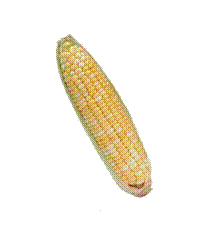
Maize is one of the three most important grains of the world. It is used as livestock feeds, processed as cooking oil and food additives, and currently as feedstocks for biofuels.
Herbicide-tolerant maize
These maize varieties work in a similar manner as herbicide-tolerant soybean. They allow growers better flexibility in using certain herbicides to control weeds that can damage crops.*Approved (for import or cultivation) in the following countries: Argentina, Australia, Brazil, Canada, China Colombia, Costa Rica, Cuba, EU, Honduras, Indonesia, Iran, Japan, Malaysia, Mexico, New Zealand, Nigeria, Pakistan, Panama, Paraguay, Philippines, Russia, Singapore, South Africa, South Korea, Switzerland, Taiwan, Thailand, Turkey, USA, Uruguay, Vietnam, and Zambia.
Insect resistant maize
This modified maize contains a built-in insecticidal protein from a naturally occurring soil microorganism (Bacillus thuringiensis) that gives maize plants season-long protection from corn borers. This means most farmers do not have to spray insecticide to protect maize from harmful pests, which can cause significant damage and yield loss in many areas. Bt maize also reduces toxin contamination arising from fungal attack on the damaged grain. The Bt protein has been used safely as an organic insect control agent for over 50 years. *Approved (for import or cultivation) in the following countries: Argentina, Australia, Brazil, Canada, Chile, China, Colombia, Egypt, European Union, Honduras, Indonesia, Iran, Japan, Malaysia, Mexico, New Zealand, Nigeria, Pakistan, Panama, Paraguay, Philippines, Russia, Singapore, South Africa, South Korea, Switzerland, Taiwan, Thailand, Turkey, USA, Uruguay, Vietnam, and Zambia.
BIOTECH RICE
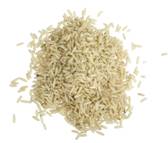
Rice is life for more than half of humanity. It is the staple food for over 3 billion people, more than 90% of whom are Asians.
Herbicide-tolerant rice
These rice varieties work in a similar manner to herbicide-tolerant soybean. They contain a gene that provides resistance to one of two broad spectrums, and environmentally benign herbicides. *Approved (for import or cultivation) in the following countries: Australia, Canada, Colombia, Honduras, Mexico, New Zealand, Philippines, Russia, South Africa, and the USA.
Deleted IR rice
BIOTECH TOMATO
Delayed-ripening tomato
The delayed-ripening tomato became the first genetically modified food crop to be produced in a developed country. These tomatoes spend more days on the vine than other tomatoes, thus resulting in better flavor. Furthermore, the longer shelf life has commercial advantages in harvesting and shipping that can reduce the costs of production. *Approved (for import or cultivation) in the following countries: China, Canada, Mexico, and the USA.
BIOTECH COTTON
Herbicide-tolerant cotton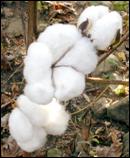
This cotton works in a manner similar to other biotech tolerant crops. For benefits, see herbicide-tolerant soybean. *Approved (for import or cultivation) in the following countries: Argentina, Australia, Brazil, Canada, China, Colombia, Costa Rica, EU, Japan, Malaysia, Mexico, New Zealand, Paraguay, Philippines, Singapore, South Africa, South Korea, Taiwan and the USA.
Insect-resistant cotton
This modified cotton works in a manner similar to insect resistant corn. It contains a protein that provides the plant with season-long protection from budworms and bollworms. The need for additional insecticide applications for these pests is reduced or eliminated. *Approved (for import or cultivation) in the following countries: Argentina, Australia, Brazil, Burkina Faso, Canada, China, Colombia, Costa Rica, eSwatini, Ethiopia, EU, India, Japan, Malaysia, Mexico, Myanmar, New Zealand, Nigeria, Pakistan, Paraguay, Philippines, Singapore, South Africa, South Korea, Sudan, Taiwan, and the USA.
BIOTECH POTATO
Insect resistant potato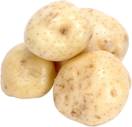
This biotech potato works like insect resistant corn. It contains a protein that provides the plant with built-in protection from the Colorado potato beetle. Thus, this potato needs no additional protection for this pest, benefiting farmers, consumers, and the environment. *Approved (for import or cultivation) in the following countries: Australia, Canada, Japan, Mexico, New Zealand, Philippines, Russia, South Korea, and the USA.
Virus resistant potato
Several potato varieties have been modified to resist potato leafroll virus (PLRV) and potato virus Y (PVY). In the same way that people get inoculations to prevent disease, these potato varieties are protected through biotechnology from certain viruses. Furthermore, virus resistance often results in reduced insecticide use, which is needed to control insect vectors that transmit viruses. *Approved (for import or cultivation) in the following countries: Argentina, Australia, Canada, Indonesia, Japan, Mexico, New Zealand, Philippines, South Korea, and the USA.
Low acrylamide potato
Innate™ potato, developed by Simplot, was approved for commercialization in the U.S. in November 2014. This biotech potato has 50-75% lower levels of acrylamide, a potential carcinogen in humans, produced when potatoes are exposed to high temperatures. It is also less susceptible to bruising. *Approved (for import or cultivation) in the following countries: Australia, Canada, EU, Japan, Malaysia, Mexico, New Zealand and the USA.
BIOTECH CANOLA
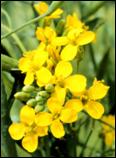 Canola is a genetic variation of rapeseed and was developed by Canadian plant breeders specifically for its nutritional qualities, particularly its low level of saturated fat.
Canola is a genetic variation of rapeseed and was developed by Canadian plant breeders specifically for its nutritional qualities, particularly its low level of saturated fat.
Herbicide tolerant canola
Herbicide tolerant canola contains transgenes conferring tolerance to herbicides. This is similar to the trait exhibited by herbicide tolerant soybean. *Approved (for import or cultivation) in the following countries: Australia, Canada, Chile, China, EU, Japan, Malaysia, Mexico, New Zealand, Philippines, Singapore, South Africa, South Korea, Taiwan, and the USA.
High laureate canola
These canola varieties contain high levels of laurate. Oil processed from these novel varieties is similar to coconut and palm oils. This new canola oil is being sold to the food industry for use in chocolate candy coatings, coffee whiteners, icings, frostings, and whipped toppings. Benefits extend even to the cosmetics industry. *Approved (for import or cultivation) in the following countries: Australia, Canada, New Zealand, and the USA.
BIOTECH ALFALFA
Alfalfa is one of the most important legumes used in agriculture.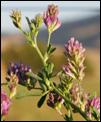
Herbicide-tolerant alfalfa
This alfalfa works in a manner similar to other HT crops.*Approved (for import or cultivation) in the following countries: Argentina, Australia, Canada, Japan, Mexico, New Zealand, Philippines, Singapore, South Korea and the USA.
BIOTECH PAPAYA

Virus-resistant papaya
This Hawaiian-developed papaya contains a viral gene that encodes for the coat protein of papaya ringspot virus (PRSV). This protein provides the papaya plant with built-in protection against PRSV. This biotech papaya works in a manner similar to virus resistant potato.*Approved (for import or cultivation) in the following countries: Canada, China, Japan, and the USA.
BIOTECH SQUASH

Virus resistant squash
A biotech yellow crookneck squash is now able to resist watermelon mosaic virus (WMV) and zucchini yellow mosaic virus (ZYMV). These new varieties contain the coat protein genes of both viruses. This biotech approach bypasses aphid control, which may reduce or eliminate the use of insecticides.*Approved (for import or cultivation) in the following countries: Canada and the USA.
BIOTECH SUGAR BEET
Herbicide tolerant sugar beet
In 2008, an herbicide tolerant sugar beet variety was planted in Canada and USA for the first time. The herbicide-tolerant sugar beet allows farmers to cut the number of required cultivations by half. *Approved (for import or cultivation) in the following countries: Australia, Canada, China, Colombia, EU, Japan, Mexico, New Zealand, Philippines, Russian Federation, Singapore, South Korea, Taiwan, and the USA.
CONCLUSION
In developed countries , the use of GM crops has evidently resulted in significant benefits. These “first generation” crops have proven their ability to increase crop yields, reduce farm costs, increase farm profit, and help protect the environment. With the “second generation” of GM crops, the focus has been on increased nutritional, pharmaceutical, and/or industrial traits. These varieties should prove valuable in countries where millions of people suffer from dietary deficiencies and have difficulties in accessing vaccines and medicines.
| |
References:
ISAAA. 2018. Global Status of Commercialized Biotech/GM Crops: 2018. ISAAA Brief No. 54. ISAAA: Ithaca, NY.. https://www.isaaa.org.
ISAAA GM Approval Database. https://www.isaaa.org/gmapprovaldatabase/.
GLOSSARY
Bt: Bacillus thuringiensis, a common soil bacterium that produces a protein toxic to certain insects
Coat protein (CP): a major component of viruses. CPs protect viral genetic information.
Enzyme: a protein that regulates chemical reactions inside every living cell and organism
Gene: a biological unit that determines an organism’s inherited characteristics
Herbicides: chemicals frequently used in agriculture to control weeds that compete with crops for soil nutrients, water and sunlight
Laurate: an important fatty acid used in the food industry, mainly sourced from coconut and palm oil
Oleic acid: a monounsaturated fatty acid found in animal and vegetable oils. Monounsaturated fats are the most benign of the fat sources and are generally considered safe as they do not cause disease or other health problems.
*Updated March 2020
